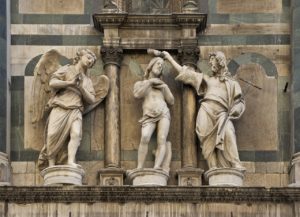Mark 1:10-111NIV New International Version Translations
10 Just as Jesus was coming up out of the water, he saw heaven being torn open and the Spirit descending on him like a dove. 11 And a voice came from heaven: “You are my Son, whom I love; with you I am well pleased.”
 Background
Background
Mark’s Gospel doen’t waste a lot of time before it moves to Christ’s ministry, the reason why He came to earth. In fact, Christ’s baptism was His first public appearance, after living a rather unknown life. At this moment in history much has been and is hidden about what is to come. As we are about to learn, Christ is taking upon himself the likeness of sinful flesh; and, for our sakes, is about to be set apart and declared holy. Christ’s ministry goes public from here!
The Greek root-word baptizein means to plunge, immerse, to sink; hence to wash; to be immersed, overwhelmed. From the Jewish rules of purification concerning ritual uncleanness the word gained a technical religious connotation implying “purification” from all that might exclude one from God’s presence. In simplicity we might then say that the baptism of Christ was to prepare Him for God’s work in this world. For Christians today, the purpose of baptism is to give visual testimony of our commitment to Christ. When a child is baptized, it is the parents, family and congregation that are giving the visual testimony to “their” commitment to raise the child in a Christ-like manner.
Our two verses also point us to the Trinity with the Spirit and the Father and the Son. It is here where we get the roots of our marching orders, to go forward and teach all nations, baptizing the in the name of the Father, Son, and Holy Spirit. It is, therefore, the Trinity that bears witness from heaven, of our mission on this earth.
John’s baptism of Christ had two components, repentance and forgiveness (Mark 1:4).
4 And so John the Baptist appeared in the wilderness, preaching a baptism of repentance for the forgiveness of sins. 5 The whole Judean countryside and all the people of Jerusalem went out to him. Confessing their sins, they were baptized by him in the Jordan River. 6 John wore clothing made of camel’s hair, with a leather belt around his waist, and he ate locusts and wild honey. 7 And this was his message: “After me comes the one more powerful than I, the straps of whose sandals I am not worthy to stoop down and untie. 8 I baptize you with water, but he will baptize you with the Holy Spirit.”
As John the Baptist explains what took place with Jesus, he adds that the baptism is not only with water, but with the Holy Spirit. Those two elements are still true of baptism today. The baptismal liturgy marks the end of the old life and beginning of a life lived under God’s grace and forgiveness. The gift of the Holy Spirit is also part of our baptism service today (“ … you have been sealed by the Holy Spirit … ”). Our own baptisms today are also witnessed by the Trinity.
The Holy Spirit gave Christ the power for His future work coming in the shape of a gentle bird. This indicates to us that Christ also came in a gentle way. This example reminds us of the same kind of gentle bird in Genesis. That a bird, a dove, came back to Noah. It was the sign of a new beginning (Genesis 8:6-12). The message from heaven is important too. It used words from the Old Testament. Isaac was the son whom Abraham loved (Genesis 22:2). God was ‘very pleased’ with the Servant whom he had chosen. Jesus therefore knew that God approved of Him. He also knew that His work would be that of a servant. He would know that the last of Isaiah’s ‘Servant’ songs spoke about a ‘suffering’ servant (Isaiah 53).
Items for Discussion
- Why are people still baptized today?
- We get baptized because Jesus commanded it.
- Baptism is a public identification with Christ.
- Baptism symbolizes our death to sin.
- Baptism is a sign of being a disciple.
- Baptism as a covenant sign, membership with the covenant made with people directly by God.
- Baptism is considered a Sacrament – What is a Sacrament?
- A Christian rite (such as baptism or communion) that is believed to have been ordained by Christ. Many Christians consider the sacraments to be a visible symbol of the reality of God, as well as a means by which God enacts His grace upon us. The definition of sacrament formulated by Augustine of Hippo2https://en.wikipedia.org/wiki/Augustine_of_Hippo is an outward sign of an inward grace that has been instituted by Christ.
- Why do you think it was necessary for Christ to be baptized?
- We all take an oath to help support the Christian life of a child who is being baptized. What do you think that means?
- What is or should be different in a person after taking an oath?
- What do you think we lose within our society of we abandon sacraments like baptism?
Discussion Challenge
- How should the Christian Church renew its vows, its baptismal oath, so that the original intent expressed by Mark is present in our world today?
- 1NIV New International Version Translations
- 2
